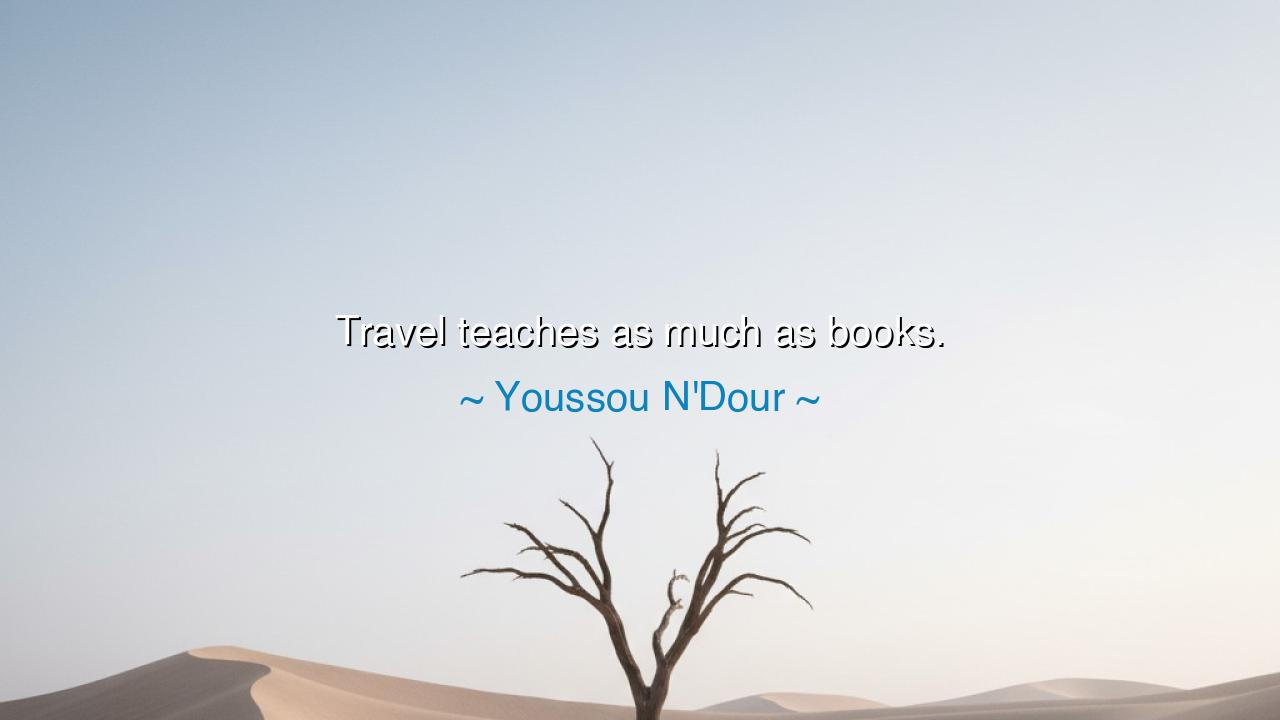
Travel teaches as much as books.






“Travel teaches as much as books.” Thus declared Youssou N’Dour, the griot and singer of Senegal, whose voice has carried the wisdom of his people across nations. His words are not a dismissal of the power of books, but a reminder of a greater truth: that knowledge has two wings, and one cannot fly without the other. The written word preserves the wisdom of the past, but travel opens the eyes to the living world, to the lessons that breathe in landscapes, faces, and cultures. Together they form the fullness of learning, but alone they leave us incomplete.
When N’Dour speaks of travel, he speaks of the encounter with what is different—the customs of another people, the flavors of unfamiliar food, the rhythm of a foreign tongue. These are not things that can be fully captured in books, for the taste of bread, the scent of spices, the song of a people’s music must be experienced to be understood. Thus travel is itself a book, but written not on parchment, but in the air, in the earth, and in the heart. He reminds us that wisdom is not only read—it is lived.
History offers us shining examples of this truth. Consider Herodotus, often called the Father of History, who did not confine himself to the libraries of Greece but journeyed to Egypt, Persia, and beyond, gathering stories from every land. His writings endure precisely because he saw with his own eyes and heard with his own ears. Or think of Ibn Battuta, the great traveler of the Islamic world, who crossed deserts, mountains, and seas for thirty years. His accounts of distant lands remain treasures of knowledge, for they reveal not only facts but the very soul of the people he encountered. These men proved N’Dour’s wisdom: travel is itself a teacher.
But N’Dour’s words also remind us of humility. For when we travel, we are stripped of the illusion that our way is the only way. The traveler who goes abroad finds that truth wears many garments: what one people call strange, another calls sacred; what one culture calls trivial, another holds dear. This revelation softens the heart, teaching empathy, patience, and respect. Books may open the mind, but travel opens the soul, for it teaches us that humanity is vast, and wisdom is scattered like stars across every corner of the earth.
Yet there is also a warning in his words. One may read many books and still be ignorant if the heart is closed; likewise, one may travel many miles and remain blind if the spirit is unwilling to learn. True learning, whether from books or from travel, demands openness, humility, and reflection. It is not the distance crossed, but the depth of attention that makes the difference. A single journey, if lived with awareness, may teach more than a hundred books read without reflection.
The lesson, then, is clear: do not neglect either wing of wisdom. Read, for books preserve the voices of those who came before, and through them you gain the counsel of ages. But also travel, for the world is itself a living library, and its pages turn beneath your feet. Walk among the people, taste their food, learn their stories, listen to their songs, and in doing so, you will gain a wisdom that no ink alone can give.
Practical actions flow easily: seek journeys, even small ones, beyond the borders of your comfort. If you cannot cross oceans, cross into the neighborhoods near you where different lives are lived. Let every encounter be a teacher, every face a book, every moment a lesson. Combine the knowledge of the written page with the knowledge of the road, and your understanding will be deep, balanced, and whole.
Thus let Youssou N’Dour’s words be remembered: “Travel teaches as much as books.” For the book teaches us what others have seen, but travel allows us to see for ourselves. The book speaks of the world, but travel makes the world speak to us. Together, they form the path of wisdom; together, they make us truly alive.






AAdministratorAdministrator
Welcome, honored guests. Please leave a comment, we will respond soon